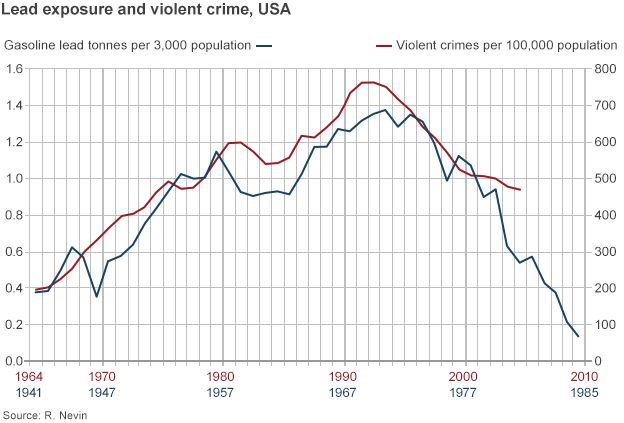Does unleaded petrol reduce violent crime?
Many Western nations have experienced significant declines in violent crime in recent decades, but could the removal of lead from petrol explain that?
Working away in his laboratory in 1921, Thomas Midgley wanted to fuel a brighter tomorrow. He created tetraethyl lead – a compound that would make car engines more efficient than ever.
 Thomas Midgley
Thomas Midgley
For most of the 20th Century crime rose and rose and rose. Every time a new home secretary took office in the UK – or their equivalents in justice and interior ministries elsewhere – officials would show them graphs and mumble apologetically that there was nothing they could do to stop crime rising.
Exposure to lead can also alter brain structure and function. At the behavioural level, exposure to lead may cause and increase in impulsive actions and social aggression, as well as increasing the likelihood of attention deficit hyperactivity disorder (ADHD).

Then, about 30 years ago, the trend reversed – and all the broad measures of key crimes have been falling ever since.
Was the lead that we added to our petrol create part of the problem? Was it the cause of a decades-long crime wave that is only now abating as the poisonous element is removed from our environment? This is the ‘lead-crime hypothesis.
This graph demonstrates what happened in the USA.

Leaded petrol was removed from British engines later than in North America – and the crime rate in the UK began to fall later than in the US and Canada.
Lead theorists say that data they’ve collated and calculated from many nations, and it shows the same 30-year trend.
An expert, Dr Bernard Gesch has said the data suggests that lead could account for as much as 90% of the changing crime rate during the 20th and 21st Centuries across all of the world.
“A lot of people would say that correlation isn’t cause,” he has said. “But it seems that the more the exposure, the more extreme the behaviour. I’m certainly not saying that lead is the only explanation why crime is falling – but it is certainly the most persuasive. Unless someone is telling us that the brain is not involved in decision-making then lead has to be relevant to crime.”
Other resources
This article is derived from BBC website and other sources, including the lead-crime hypothesis on wikipedia.

